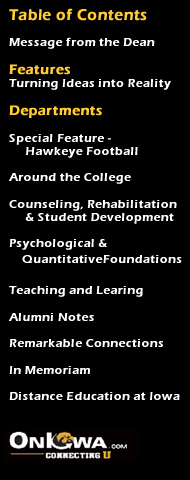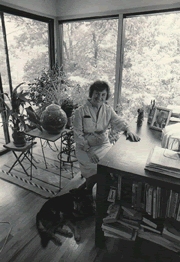
|
|
Beatrice Wright (MA ’40, PhD ’42) is a pioneer in her field, credited with revolutionizing the way psychologists approach issues involving disability. The 90-year-old got her start at The University of Iowa and is considered a founding mother of the College of Education’s Rehabilitation Counseling Program, which was formed as the first rehabilitation counseling program west of the Mississippi River after she completed her dissertation. Wright’s colleagues describe her as one of the “most well-respected, prominent, and inspirational rehabilitation psychologists in the history of rehabilitation.” Sheryl Wurl, a doctoral candidate at the University of Tennessee, is writing her dissertation about Wright’s life and influence. “It has been a real eye opener for me to discover how important she still is,” Wurl said. “She’s just phenomenal—a hidden gem and a living archive.” But Wright’s path to excellence wasn’t easy. She faced criticism from school leaders for pursuing her doctorate and even struggled to convince the dean to sign her registration card because she was a wife. “I owe my parents a great deal for my ability to hang on to basic values,” Wright said, adding that she also enjoyed strong support from her husband, M. Erik. Because of the labor shortage during World War II, Wright became involved with disability issues as employers searched for people to work in their factories. “As a psychologist, I was able to evaluate people who were otherwise unemployable and convince the factory that this person could function very well with a little bit of accommodation,” she said. In addition to putting her ideas about what she calls “understanding how to bring about a constructive life with a disability” into practice, Wright was able to do important research during World War II. “Most of the research I reviewed convinced me that the scientific literature at the time contributed to the stigma of disadvantaged people rather than to an understanding of their abilities and strengths,” she said. Wright also coauthored research on the treatment of veterans who returned from war injured or otherwise disabled and how the veterans viewed themselves. Following the war, Wright published what is among her best-known work: Physical Disability: A Psychological Approach. The textbook, published in 1960, was soon used in college classrooms around the country. In fact, the book helped secure her a faculty position in the University of Kansas Department of Psychology faculty. Her husband, Erik, was a professor with the department and anti-nepotism rules had previously closed the door to Wright. But when her book became a primary text in the department, the anti-nepotism rule was rescinded. Wright joined the faculty in 1964. She and Erik became the university’s first to be hired as a tenured married couple. In 1995, Wright left Kansas and took a senior lecturer position at the University of Wisconsin, Madison. The move allowed her to live near one of her three children. Now retired, Wright continues to write and in 2007 returned to the UI to receive the Pioneer Award from the Rehabilitation Counseling program. Wright said she’s seen a lot of changes in the rehabilitation counseling field. She also is following the so-called “new” field of Positive Psychology, which promotes research that contributes to human potential. “I made the point of a positive approach 60 years ago, and I think maybe it’s finally being heard now,” Wright said. “They call it a new field, but it isn’t new.” Henry McCarthy, a Rehabilitation Counseling professor at Louisiana State University, noticed the same return to and supposed reinvention of Wright’s concepts in his study, “The Conceptual Legacy of Beatrice Wright: Capturing its Manifestations in Contemporary Rehabilitation Research and Practice.” He described the project as based on a “kindred spirit connection to Wright and a sense that her work was an important legacy to articulate and disseminate.” Wright hopes the legacy of her work will be her focus on people with disabilities and understanding what a constructive life with a disability means. “That requires focusing on the person in an environment because no person lives without surroundings. Those surroundings can foster human development, meaningful abilities, interests, and talents, or they can impede those great, great assets,” she said. The American Psychological Association selected her 1960 book and her 1983 book, Psychological Disabilities—A Psychosocial Approach for its cannon of distinguished books in psychology that “once defined and continue to influence the way we conceptualize and experience the world.” Looking back at her contributions to rehabilitation counseling, Wright is grateful and humble. “Every life is remarkable and extraordinary in some way,” she said. “In my case, I’m just grateful that I was able to make a contribution that appears to be important for the larger society.” |


